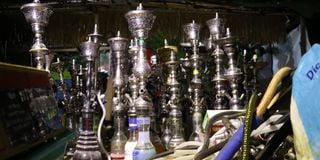Premium
Nacada seizes over 100 shisha pots from popular club in Mirema, Kasarani

Shisha smoking equipment seized during Nacada raids.
What you need to know:
- Earlier, in 2014, Nacada, in collaboration with the Ministry of Health, banned 19 flavours of shisha that were found to contain bhang, heroin and cocaine.
- According to the report, 79.2 per cent of the shisha samples collected tested positive for heroin.
Police on Tuesday night arrested two people and seized 109 shisha pots at the Al Fakher Lounge in Mirema Drive, Kasarani, following a crackdown by the National Authority for the Campaign Against Alcohol and Drug Abuse (Nacada).
Patricia Wanza and Asmelder Wambui were arrested during the operation, which ended in the early hours of Wednesday, and other suspected contraband was also seized from the premises.
The night operation was conducted by Nacada in collaboration with officers from the Directorate of Criminal Investigations (DCI).
"220 flavours of chewing gum, 400 pieces of coconut charcoal, 16 charcoal carriers, 140 orange mint flavours, 29 mint flavours, 50 grape mint flavours and other items used in the consumption of shisha were seized," police said in a statement.
Since December 2023, Nacada has intensified its crackdown to curb the sale and consumption of shisha products which are banned in Kenya.
More than 60 raids have been carried out on clubs and party venues in Nairobi and Mombasa.
Earlier this month, Nacada raided Beirut, a popular nightclub in Nairobi, and arrested revellers smoking shisha.
In a statement, the authority said the enforcement team caught four revellers in the act and also seized five shisha bongs and 24 packets of different flavours.
In 2017, Kenya introduced a comprehensive ban on shisha, including its use, importation, manufacture, sale, offer for sale, advertising, promotion, distribution and encouraging or facilitating its use.
"Any person who contravenes any provision of these rules may, where a penalty has not been expressly provided for under any provision of the Act, be liable to the penalty contemplated under section 163 of the Act," the then Health CS Cleopa Mailu said on December 27, 2017, when he announced the ban.
Dr Mailu also noted that in Kenya, shisha was a front for the use of hard drugs such as heroin and bhang.
Earlier, in 2014, Nacada, in collaboration with the Ministry of Health, banned 19 flavours of shisha that were found to contain bhang, heroin and cocaine.
According to the report, 79.2 per cent of the shisha samples collected tested positive for heroin.
"The findings indicate that adulteration of with heroin may be an endemic problem in the country and there is a likelihood that shisha may be emerging as a concealment route for heroin trafficking," the report read.
Kenya became the fourth country in East Africa to ban shisha after Uganda, Tanzania and Rwanda.
But even after the ban, shisha is still widely sold in the country, especially in nightclubs.
In December, Defence Cabinet Secretary Aden Duale called for intensified operations to crack down on shisha dens in nightclubs across the country.
Duale insisted that the ban on shisha must be strictly enforced to ensure that guilty owners and users are brought to book under the law.
“Shisha addicts must face the law, as it has been illegal in Kenya since 2017. Law enforcement agents must raid dens,” he said.
Shisha is a glass-bottomed water pipe in which fruit-flavoured tobacco is wrapped in foil and roasted with charcoal.
The tobacco smoke passes through a water chamber and is inhaled deeply and slowly.




